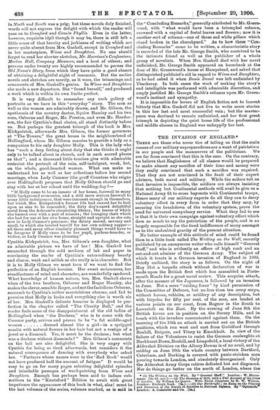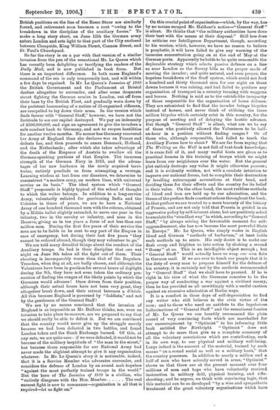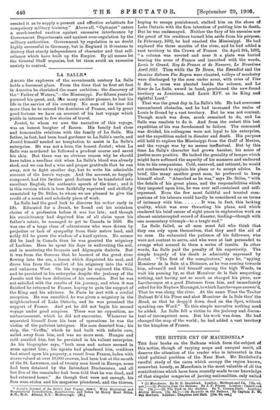THE INVASION OF ENGLAND.* THERE are those. who never tire
of telling us that the main causes of our military unpreparednessare a .want ofpatriotisni in our people and .the „manosuvres of the politicians. We are far from convinced that this is the ease.; On the contrary, we believe. that Englishmen of all classes would- be prepared to make almost. any sacrifice of their time and .money were they .really convinced . that such a sacrifice was required. That they are not convinced is _the .fault of their expert advisers, both naval and military. While the sailors tell us that. invasion is impossible, the soldiers are always insisting that .nothing but Continental methods will avail to give, us a .National Army. fit to cross bayonets with Continental troops. Hence many of our military experts do all they. can to deety voluntary, effort in every form in order that they may, by securing . the breakdown of .the voluntary system., prove the need for universal compulsory service. What they fail to see is that it is their own campaign against voluntary effort which does so much to sap the patriotism of the people,:and is .so largely responsible for the tired indifference of many amongst us to the. undoubted gravity of the present situation.
No better example of this attitude of mind, could be.founil than in a little book called The Writing on, the Wall, recently published by an anonymous writer who calls himself "General Staff," and who is evidently an officer of high rank and an out-and-out admirer of the German Army. The subject of which it treats is a German invasion of England in 1908. Briefly outlined, the story is as follows. On the night of May 31st a torpedo attack without declaration of war is made upon the British fleet which has assembled in Ports- mouth Roads for a great naval review. This surprise attack, after the manner of the Japanese, is followed by an invasion in June. Not a mere "raiding force" by. kind permission of the Committee of Defence, but lie less than ten army corps, without horses, vehicles, or artillery of any description, but with bicycles for fifty. per cent, of the .men, are landed at various points on our coast, from. Bognor in the South to Lowestoft on the East. By the evening of- June 9th the British forces are in, position. on the Surrey Mills,, and in touch with the invaders concentrated against them. On the morning of the 10th an attack is carried out on_ the British positions, which run west and east from Guildford through Boxhill, Reigate, and Titsey.to Knockholt. In view of the failure of the Volunteers to resist the German onslaughts at Hackhurst Down, Boxhill, and Limpsfield, a local victory of the Aldershot Division on the .Albury Downs is of no avail, and by midday on June 10th the whole country between Dartford, Caterham, and Dorking is covered with panic-stricken men pouring towards London, and absolutely disorganised. Only the Aldershot Army Corps retires..defeated but. not disgraced. Nor do things go better on the north of .London, where the • (1) The Writing on the Wall. By • General Staff." London W. Heine- mann. Rs. 6d. net.]—(2) Ths isinunan of 1910, with Sal ..hosaunlA+f ths,,Siego of London. By William Le Queer.. With Naval Chapters by H. W. WilSon. London : Eveteigh Nash. [8e.]--(3) Oar Birthright a an Essay en the yitelita and Resources of the Nation in Rotation to National Dsjipsea. By "Optimist. London : A. Constable sad Co, . British positions on the line of the Essex Stony are similarly. forced, and retirement soon becomes a rout "owing to the breakdown in the discipline of the auxiliary forces." To make-a long story short, on 'June 12th the German army enters London and sets light to that part of the City enclosed' between Cheapside, King William Street-, Cannon Street, -and- St: Paul's Churchyard.
So fat the story is on a par with that version of a similar invasion from the pen of the sensational Mr. Le Queux which Las recently been delighting or terrifying the readers of the Daffy 'Mail; and is now published in book form. But there is an important difference. In both cases England's command of the sea is only temporarily-lost, *and will within a few days be regained. In Mr. Le Queux's Invasion of 1910 the -British Government and the 'Parliament at Bristol decline altogether to surrender, and after some desperate street fighting the German armies in London, cub off from their base by the- British Fleet, and gradually worn down by the peristent hammering of a nation- of ill-organised riflemen, are compelled to lay down their arms. In the 'version which finds favour with "General Staff," however, we have not the fortitude to see our capital destroyed. We pay an indemnity of T500,000,000, and sign an'agreement to give the invaders a- safe conduct back to Germany, and not to reopen hostilities for another twelve months. No sooner has Germany recovered her Army of England than she declares war on France and defeats her, and then proceeds to annex Denmark, Holland,- and the Netherlands ; after which she takes advantage of the death of the Emperor of Austria' to swallow all the' German-speaking portions of that Empire. The imnienite strength of the German Navy in 1913, and the advan- tages of her new harbours in the newly acquired terris tories; entirely preclude us from attempting a revenge: Learning wisdom at last-from our disasters, we determine to reconstruct "a modern army,-on modern lines, with universal service as its basis." The ideal system which' "General Staff ". propounds is highly typical of the school of thought to which the writer belongs. In addition to a long-service Army; voluntarily enlisted for garrisoning India and the Colonies in times- of peace, we are to have a National - Army' ofone hundred thousand men with the colours;obtained by a Militia ballot slightly extended; to serve one year in the infantry, two in the cavalry or infantry, and nine in the - Reserve,-giving us in ten years a force of not less than one million men. During the first five years' of their Service the men are to be liable to be sent to any part of the Empire in case of emergency, but during their last five years "they cannot be ordered abroad, though. they may volunteer to go."
We are told many dreadful things about the conduct of the Auxiliary troops. So bad is their discipline that one *et night on -June 9th takes all the fight out of them: Their shooting is incomparably worse than that of the Regulars. Trenches, when dug at all, are badly chosen, and although the Volunteers have been in position for several hours of daylight during the 9th, they have not even taken the ordinary pre- caution of finding the ranges of the likely points by which the Germans would advance ! Once driven from their position; although their actual losses have not been very great, they altogether break down, and their retreat becomes a debacle. All this because England is governed by "faddists," and not by the gentlemen of the General Staff !
We are by no means convinced that the invasion of England is as impossible as Mr. Balfour thinks, nor, were an invasion to take place to-morrow, are we prepared to say that we should really be able to defeat it. But we are convinced that the country would never give up the struggle merely because we had been defeated in two battles, and found London taken and the Stock Exchange burned. Of this, at any rate, we are quite sure : if we were defeated, it would not be because of the military ineptitude of "the man in the street," but -because those responsible for our National Army had never made the slightest attempt to give it any organisation whatever. In Mr. Le Queux's story it is noticeable, indeed, that it is a Service Member who advocates surrender, and considers the defence of London by an armed mob hopeless "against'-the most perfectly trained troops in the world." But the -hero -of sThe Invasion of 1910 is a civilian, who "entirely- disagrees with the Hon. Member The real earnest fight is now to commence—organisation is all that is required—let us fight -Ole On this crucial point of organisation—which, by the way, has by no means escaped Mr. Haldane's notice—" General Staff' is silent. He thinks that "the military authorities have done their best with the means at their disposal." Still less does he criticise our Intelligence Department, though, according to -his version, which, however, we have no reason to -believe is prophetic, it will have failed to give any warning of the 'immense -concentration going on at the end of May-at the German ports. Apparently he holds to be quite reasonable the deplorable strategy which selects passive defence on a line • en near London as the Surrey hills as the proper mode of meeting the invader; and quite natural, and even proper, the hopeless breakdown of the Staff system, which meld not feed- a hundred and thirty thousand men for one night on those downs because it was raining, and had failed to produce any organisation of transport in a country teeming with waggons and horses. Nothing is said as to the ostrich-like incapacity of those responsible for the organisation of home defence. They are astonished to find that the invader brings bicycles instead of horses, and never think of utilising the three million bicycles which certainly exist in this country, for the purpose of meeting and of delaying the hostile advance. But though "General Staff" is silent, what are we 'to say of those who positively allowed the Volunteers to be half- an-hour in a position without finding ranges P Or of those who, although responsible, had failed to teach the Auxiliary Forces how to shoot P We are far fromstaying that The Writing on the Wall is not full of text-book knowledge; it is cram full of it, and many useful hints are given as to practical lessons in the training of troops which we might learn from our neighbours over the water. But the general plot entirely destroys any value it might otherwise possess ; and it is evidently written, not with a resolute intention to improve our national forces, but to complete their destruction by levelling extravagant accusations at their head, and deriding them for their efforts and the country for its belief in their value. On the other hand, the most ruthless methods of blood and iron are held up to our admiration, and the theme of the preface finds constant echoes throughout the book. In that preface we are treated to a mere travesty of the history of Prussia, and are not only told that Prussia is guided in an aggressive policy by self-interest alone, but are positively asked to emulate the "steadfast way" in which, according to "General Staff," "by always seizing the favourable moment for self- aggrandisement, she has now become the most powerful State in Europe." Mr. Le Queux, who simply wades in English blood and German "methods of barbarism," at least holds such methods up to scorn. His only desire is to makd our flesh creep and frighten us into action by shaking a second Boney" at us. This is an intelligible object enough ; but "General Staff" would actually have us wrap our own fiats in German mail. If we are ever to teach our people that it is the duty of every man to prepare himself for the defence of his country, it is certainly not by the methods recommended by "General Staff" that we shall have to proceed. If he is right in his view of what the Germans conceive to be the proper way of conducting a war against a civilised enemy, then be has provided us all unwittingly with a useful caution against an excessive admiration of Berlin ways.
It is a comfort in these days of self-depreciation to find any writer who still believes in the civic virtue of the race ; and to those who need an antidote to the lugubrious hallucinations of "General Staff" and the sensational fancies of Mr. Le Queux we can heartily recommend the plain record of very convincing facts which are marshalled for our encouragement by "Optimist" in his informing little book entitled Our Birthright. " Optimist " does not attempt to do more than give us a complete summary of all the voluntary associations which are contributing, each in its own way, to our physical and military well-being. Large indeed is the amount of the material, trained by such means "on a sound social as well as a military basis," that the country possesses. In addition to nearly a million and a half of men who have actually served in arms, " Optimist " shows us that there are at the present moment over four millions of men and boys who have voluntarily received instruction in military drill, physical training, and rifle- shooting ; and he argues, we think with convincing logic, that this material can be so developed "by a wise and sympathetic treatment of the great voluntary organisations which have created it as to supply a present and effective substitute for compulsory military training." Above all, "Optimist" enters a much-needed caution against excessive interference by Government Departments and against over-regulation by the military authorities. Government by regulation is no doubt highly successful in Germany, but in England it threatens to destroy that sturdy independence of character and that self- reliance which have built up the Empire. By all means let the General Staff organise, but let them avoid an excessive anxiety to control.












































 Previous page
Previous page